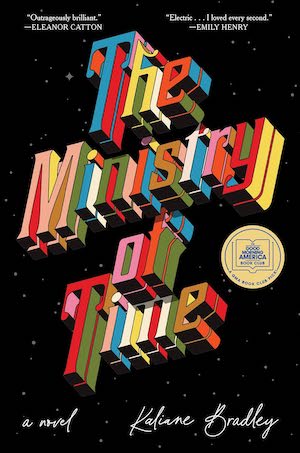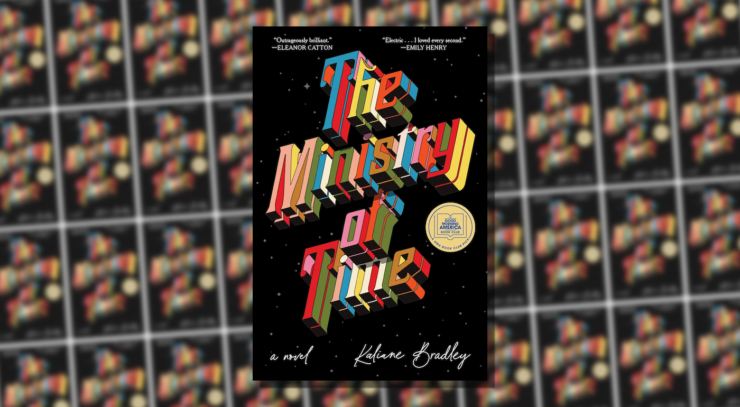I am never going to watch the AMC television program The Terror (I am a fraidy-cat), but if the fandom for the AMC television program The Terror were incarnate in a single person, I would kiss that little weirdo right on the face. Every time my fannish life overlaps a little bit with The Terror fandom, I experience warm and fond feelings for a group of people who are fannishly insane in much the same way as me (the kind that comes with a lengthy bibliography). And now it has given us Kaliane Bradley’s The Ministry of Time.
With textureless hetfic escaping fandom containment left and right recently and making its way into romance novels, I feel duty-bound to report on a few things that The Ministry of Time is not:
- a romance novel (I would classify it as “romantic tragedy with jokes” a la Tom Stoppard’s Arcadia)
- The Terror fanfic with the serial numbers filed off
While author Kaliane Bradley does thank The Terror in her acknowledgements, she elsewhere describes the first iteration of her book as “a daft story about what it would be like if your favorite polar explorer was [sic] your housemate.” In other words, The Ministry of Time is undisguised, unreconstructed polar exploration RPF (Real Person Fic), which frankly is a great idea and more people should be doing it.
The story follows an unnamed civil servant who gets a new position working with “refugees of high interest status and particular needs.” Once she accepts the job, she finds out that the refugees in question are expats not from other countries but from other centuries. They’ve been yoinked out of their own time—where they were doomed to die via things like guillotine, witch-burning, and freezing to death in the Arctic—and now require careful monitoring to determine the impact of time travel on the human body. Our protagonist is assigned as minder to Lieutenant Graham Gore, lately of the Franklin expedition, but as time goes on and the expats settle into their new world, she and Graham begin to suspect that the government has not been truthful about the goals and methods of the time travel project. There is also a certain amount of the two of them staring at each other’s mouths.
At first, Graham and the narrator are curiosities to each other. Graham has two centuries of history to catch up on, and the narrator—his “bridge,” as she’s called—has been coached to record his every movement, as well as to find “teaching moments” in which to get him up to speed on modern-day norms. Other bridges are able to—or choose to—maintain their professional distance, to think of their expats as test subjects rather than people. Our narrator doesn’t, or can’t. Graham becomes a person to her, a person with “a willow line” of eyelashes and a habit of smoking in the bath. (He also uses a combination of charm and the newly acquired phrase “quality of life” to acquire things he wants, like an endless supply of cigarettes and an air rifle for hunting pigeons in the London suburbs.)
Buy the Book


The Ministry of Time
Through him, she also grows to love his fellow expats Arthur (a traumatized World War I escapee) and Maggie (my heart, my world, my everything). The community that blossoms among the expats, especially perfect angel Maggie Kemble who has never done one single thing wrong in her entire life, provides an elegant way to shift the reader’s perspective on what the narrator owes to her job and her country’s future, and what she owes to these all-too-real human people. If the bridges don’t care for them as people, then nobody will, because the project certainly does not. At one point, another bridge, Semellia, tries to advocate for the expats to receive mental health care, and she’s shut down with a curt “Thanks for your input.”
In her 1962 novel Love and Friendship, Alison Lurie wrote, “The power of society is such that, no matter how much we despise it, our crimes are always against individuals.” The Ministry of Time cares deeply about the individuals. Though our narrator doesn’t know the aims of the time travel project, she keeps hoping that there might be a way to fix the world that she lives in, and the world that’s to come. Her near-future London suffers battering heat waves, and global warming, surely, could have been averted? Surely the small moral compromises that get made along the way, the unease she feels in conversations with her colleagues, would be worth it, then? Bradley makes the case that there can be no future separate from the people that comprise it.
If you’re writing a book that asks the reader to support a burgeoning romantic relationship between a modern-day woman and a time-traveling polar explorer, the British Empire is the inevitable elephant in the room. Available options include depicting said explorer as a uniquely enlightened snowflake who had the correct opinions all along; dedicating an ungodly amount of narrative space to leading the explorer character to embrace the appropriate liberal shibboleths; or not talking about empire at all and hoping the reader won’t worry too much about it.
As someone who would worry so much about it, I was relieved to find that Bradley ignores the third option and finds a stellar tight-rope balance between the first two. Our narrator is the daughter of a white British father and a Cambodian refugee mother, and her position as a white-passing biracial agent of the British government allows the book to take a refreshingly nuanced approach to discussions of race, power, and empire.
Graham Gore’s life and opinions are less exhaustively documented than, say, Shackleton’s, so Bradley has some leeway to make her own decisions about what kind of person he is. But she doesn’t avoid the blameworthy points of his biography, either: In real life, Gore saw action in the Aden Expedition, which suppressed Arab resistance to the British takeover of Aden. The book baldly describes this event as a “bloodbath,” and its significance in the arc of Gore’s life—whether in his own time or ours—arises repeatedly over the course of the book.
Bradley threads a difficult needle here. She gestures at the ways in which—like Graham, and frankly like the reader—the narrator contributes to deeply immoral societal structures, but she resists the impulse to glib absolution for either of them, or for the reader. Graham is guilty; the book’s narrator is guilty; we are guilty. If that sounds grim to read, I promise you that somehow it is not. It’s accomplished with wry humor and a light hand, via kicky dialogue that illustrates the growing connection between Gore and the narrator.
We assume a particular outcome from the temporal disconnect between the book’s two central characters. Graham will be forced to question his assumptions. Maybe along the way he’ll remind the narrator about some of the structural injustices we tolerate and rationalize, even. Eventually, though, Graham will arrive at the correct moral conclusions as understood by our more morally enlightened modern age. It’s not historical chauvinism if we here now really are better than all the generations of people who came before us!
That is, at least, how the narrator thinks about it. But she’s writing in first-person, which means she’s writing from the future, which means that the her who is writing knows more than the her being written about. “I exist at the beginning and end of this account simultaneously, which is a kind of time-travel,” she reminds us. The her who is writing keeps urging the reader—and we keep ignoring her, because we also think we know best—to set down our assumption of superiority. It isn’t just wrong, it’s dangerously wrong. Those who forget the past—rather, those who believe they have nothing to learn from it, only things to teach—are doomed to repeat it.
Perhaps inevitably, the book’s attention to character, relationship, and theme comes at a cost to the nuts-and-bolts of how time travel works and what everyone’s goals for it are. A friend of mine is worryingly prone to reading time travel books I’ve recommended her and then closely questioning me on the logistics, and I could hear her voice in my head as I was reading The Ministry of Time: “Remind me where they got the time machine in the first place? And why did Adela say that killing the protagonist wouldn’t matter? And can you remind me what the mole character was hoping to achieve?” On the first read, there is simply no chance I’d have been able to answer these questions. On a second read, I was prepared to make a stab at them, but did not feel that my answers would readily withstand cross-examination. Bradley is simply not as interested in the science, the spying, or the government conspiracy; and at times that disconnect really shows.
This was fine by me. So the antagonists never fully come into focus—who cares? Aren’t the real villains the friends we make along the way? Bradley’s such a master of the tiny moments between people that it’s hard to focus on the exact mechanics of the betrayal; it’s enough that the creeping trickle of unease has now crescendoed into a tsunami that leaves devastation in its wake. “This was one of my first lessons in how you make the future,” says the narrator. “Moment by moment, you seal the doors of possibility behind you.” I thank The Terror fandom once again for opening the doors of possibility to this funny, sexy, melancholy, postcolonial, completely unhinged time travel story.
The Ministry of Time is published by Avid Reader Press.











I’m about half way through and I love it. Since I haven’t ever heard of the Terror, I guess I have that ahead of me. Exdellent.